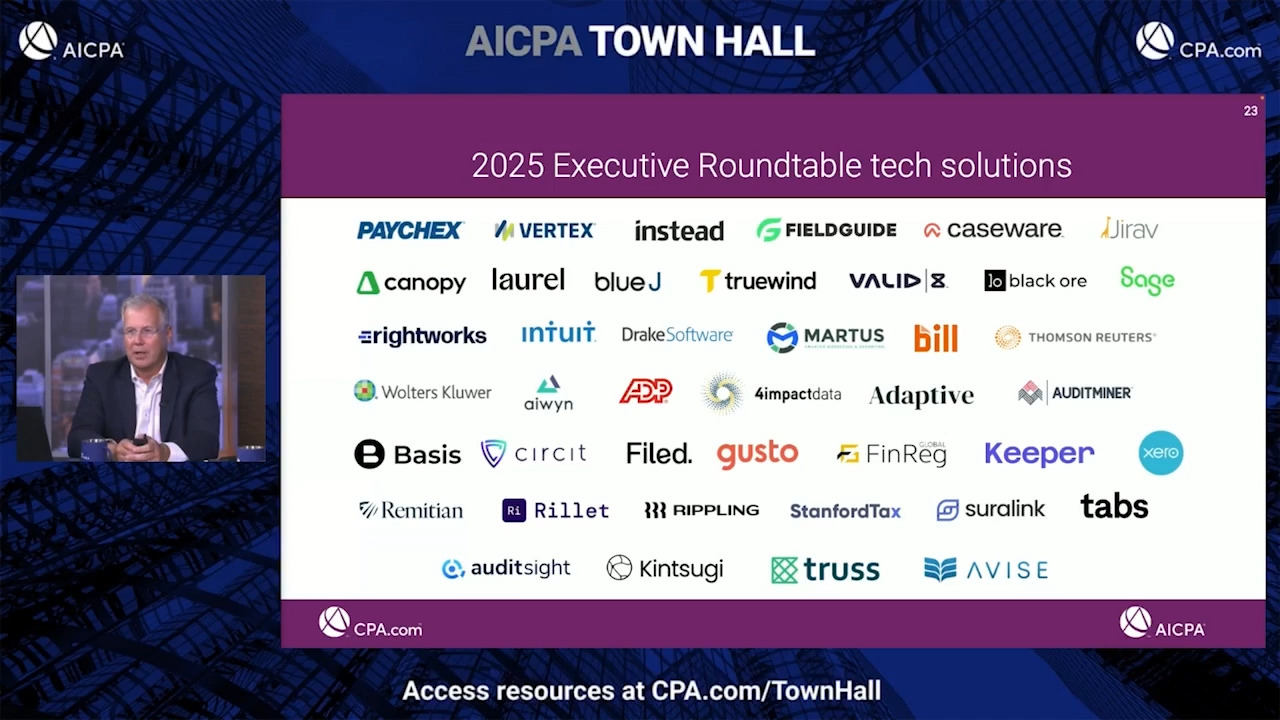During a recent AICPA Town Hall, CPA.com CEO Erik Asgeirsson, AICPA CEO Mark Koziel and AICPA VP of firm services Lisa Simpson share top takeaways from the 2025 Executive Roundtable.
It's a pivotal moment in the accounting profession. A new wave of innovation — powered by artificial intelligence, automation and changing business models — is redefining how firms and finance teams create and deliver value.
At this year's annual CPA.com and AICPA Executive Roundtable, leading technology innovators across the accounting and finance ecosystem came together to discuss how they are helping firms rise to this moment. In the spirit of co-opetition — a hallmark of this event — there was lively discussion and debate on the impact of AI across the profession.
Here are the four key themes that emerged at this year's Roundtable:
Automation is a driver for advisory growth
Rapidly becoming a competitive differentiator, automation is enabling firms and finance teams to reduce the time spent on routine tasks, creating capacity for higher-value client work.
The key is knowing which areas are best suited for automation. Reconciliation, reporting, data entry, payroll and tax and audit workflows can be handled more efficiently and accurately by technology. At the same time, technology companies are pouring billions of dollars into building automation-first solutions, accelerating adoption across the profession.
As more manual processes become minimized, practitioners can focus more time on strategic guidance, business insights and proactive advice that drives both firm growth and client success.
AI and innovation are redefining practice areas
With the emergence of new and enhanced AI-enabled solutions, firms are reevaluating workflows, processes and service delivery. This can also impact staff roles and skill sets. As more automation takes root, it will likely mean less focus on preparation-based work to more reviewer-based responsibilities. Firms will need to account for and manage this change across the different practice areas:
- Client advisory services (CAS): With new capabilities enabling firms todeliver continuous forecasting, cash flow modeling and real-time insights, CAS practices are shifting beyond the transactional to become embedded strategic partners — advising clients on decision-making, scenario planning and long-term growth. For many firms, CAS serves as a gateway to deeper advisory relationships, new revenue streams, and greater impact.
- Tax: Generative AI is accelerating research and planning, allowing tax professionals to get faster, reliable answers for their clients — while also freeing them up to focus on delivering deeper insights, analysis and strategic guidance.
- Audit: Intelligent automation and advanced analytics reshape methodologies and strengthen risk assessment. By reducing sample sizes and improving accuracy, technology gives auditors more time for judgment, interpretation and meaningful client conversations.
Adoption depends on successful change management strategies
Technology alone does not transform firms; it also requires the buy-in and commitment of your people. Change is hard, and firm leaders must be clear about the hurdles: change fatigue, generational differences and the comfort of what is familiar. Successful transformation requires cultural alignment, clear communication and leveraging champions within the firm who can help teams see what's in it for them — including increased efficiency and the ability to deliver higher-value and more meaningful work for their clients.
Unlocking value to power growth
As firms move deeper into advisory, the question of how value is created and delivered becomes front and center. Traditional success measures like billable hours and task efficiency become far less relevant indicators. Clients are looking for outcomes: growth, adaptability and a trusted advisor who can help them achieve their goals.
Firms that embrace an outcomes-first approach are thinking differently about pricing models, client experiences and how their teams are equipped to solve bigger, more strategic challenges. As firms step into this higher level of advisory, success depends on their ability to deliver not just solutions, but meaningful, measurable impact.
The path ahead
There continues to be a lot of hype and excitement around the promise of AI. But there is also a lot of anxiety and confusion. While firms should be thoughtful and measured in their approach, there is little doubt it is going to have a meaningful impact on the future state of how firms operate and deliver value to clients. The firms leading the next era are actively embracing this moment not just as a technology shift, but also as a chance to redefine their roles as trusted advisors.
By embracing AI, automation and innovation with intention, firms can build upon a foundation of trust — enhancing transparency, confidence and collaboration — while unlocking new ways to grow and deliver value.
If you want to explore more, here are a few additional resources to guide your learning:
- CPA.com's multi-part AI initiative, for reports, a toolkit, use cases and learning resources
- CPA.com's resource library for expert guidance and tools to help you grow your practice
- Watch the full Town Hall episode for Congress updates, key profession insights, and strategies to manage risks heading into the 2026 busy season


